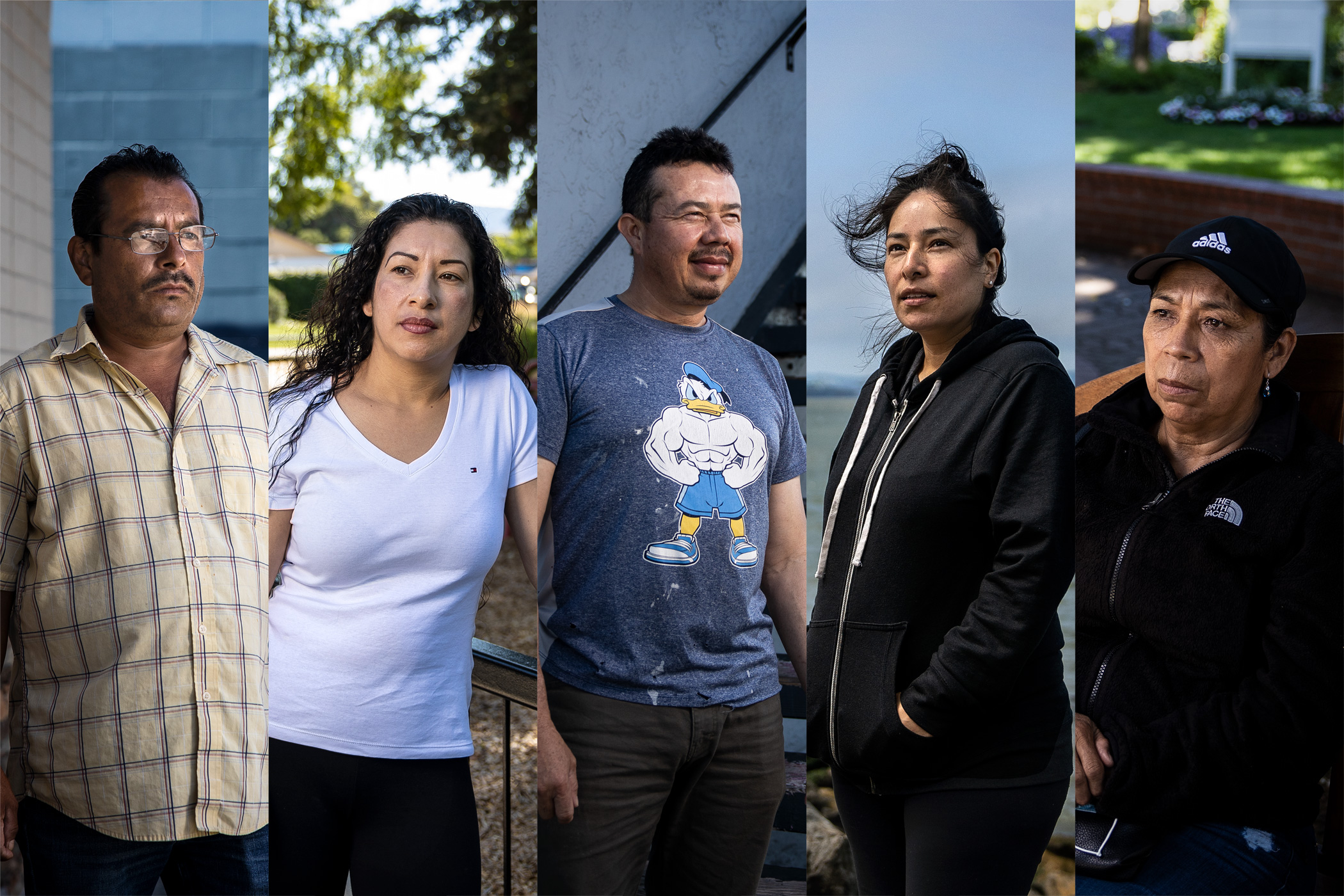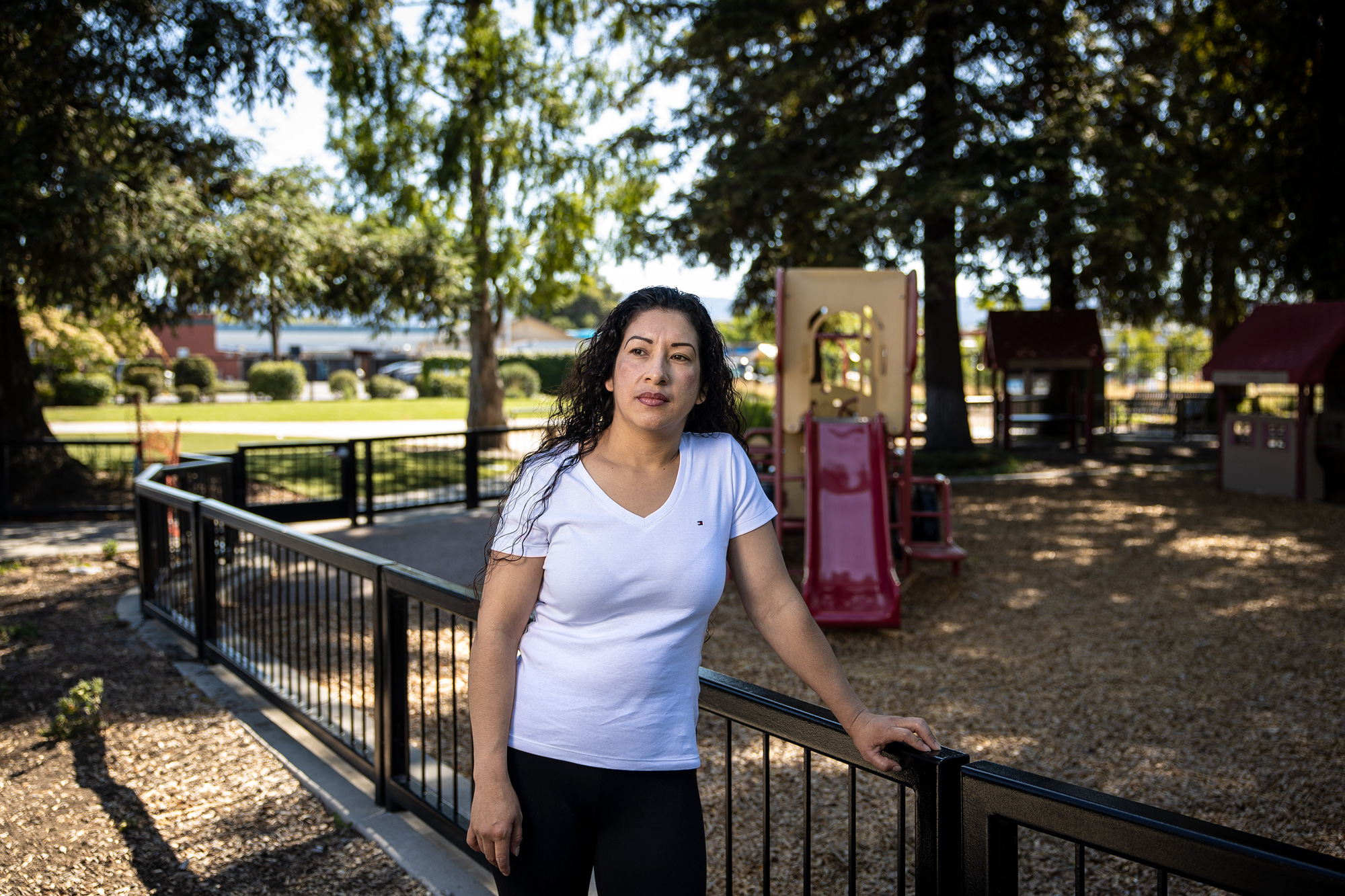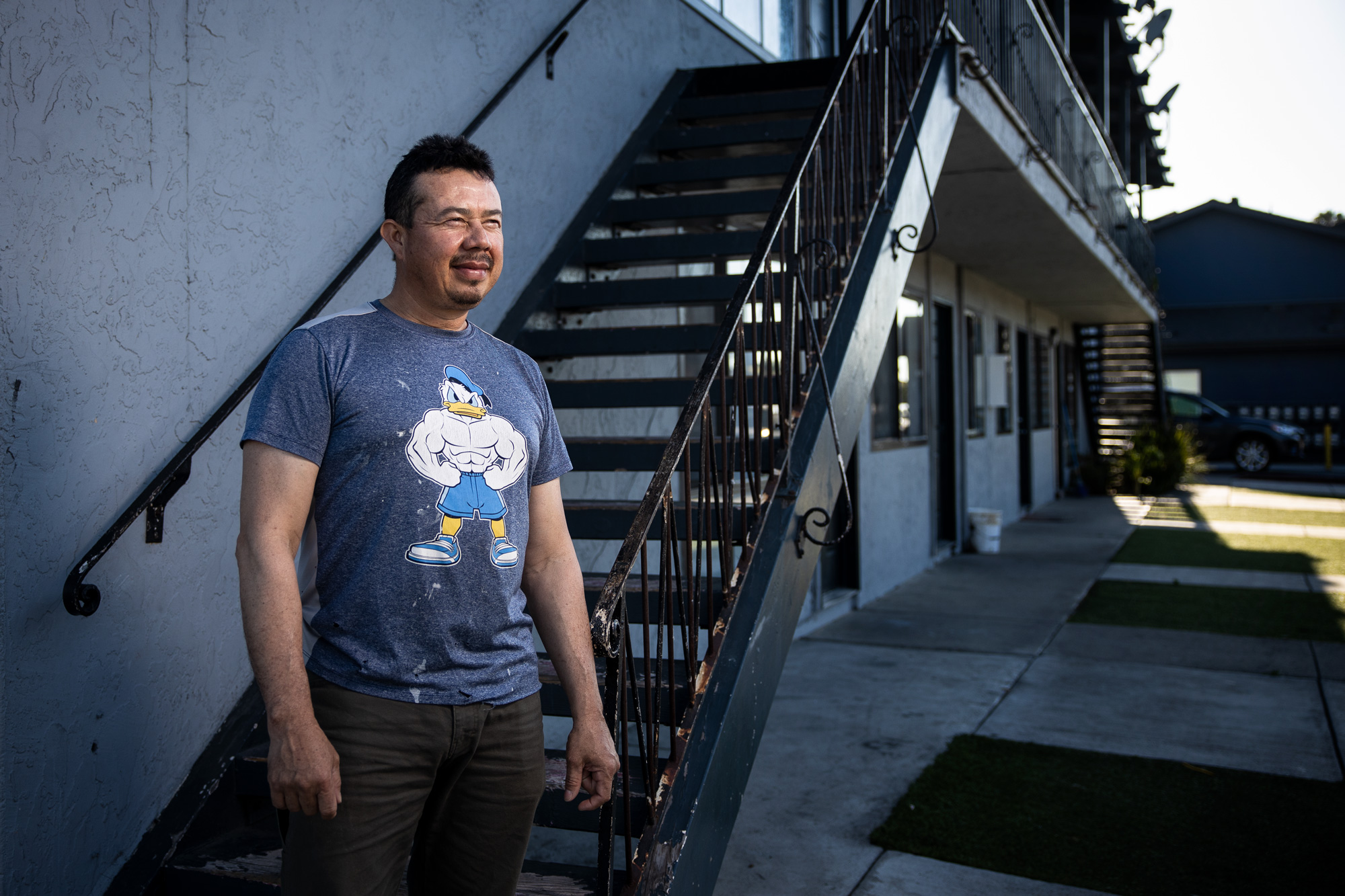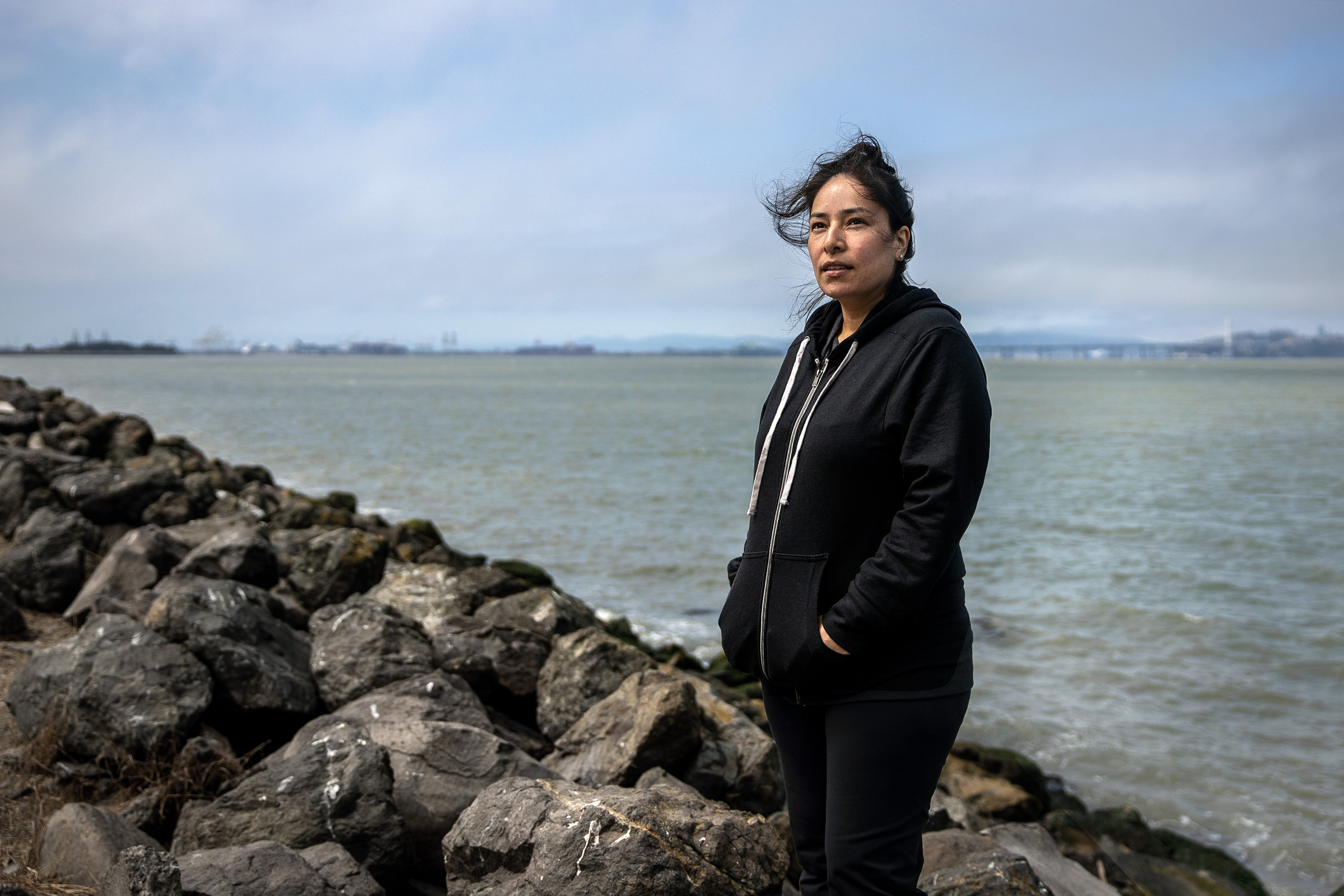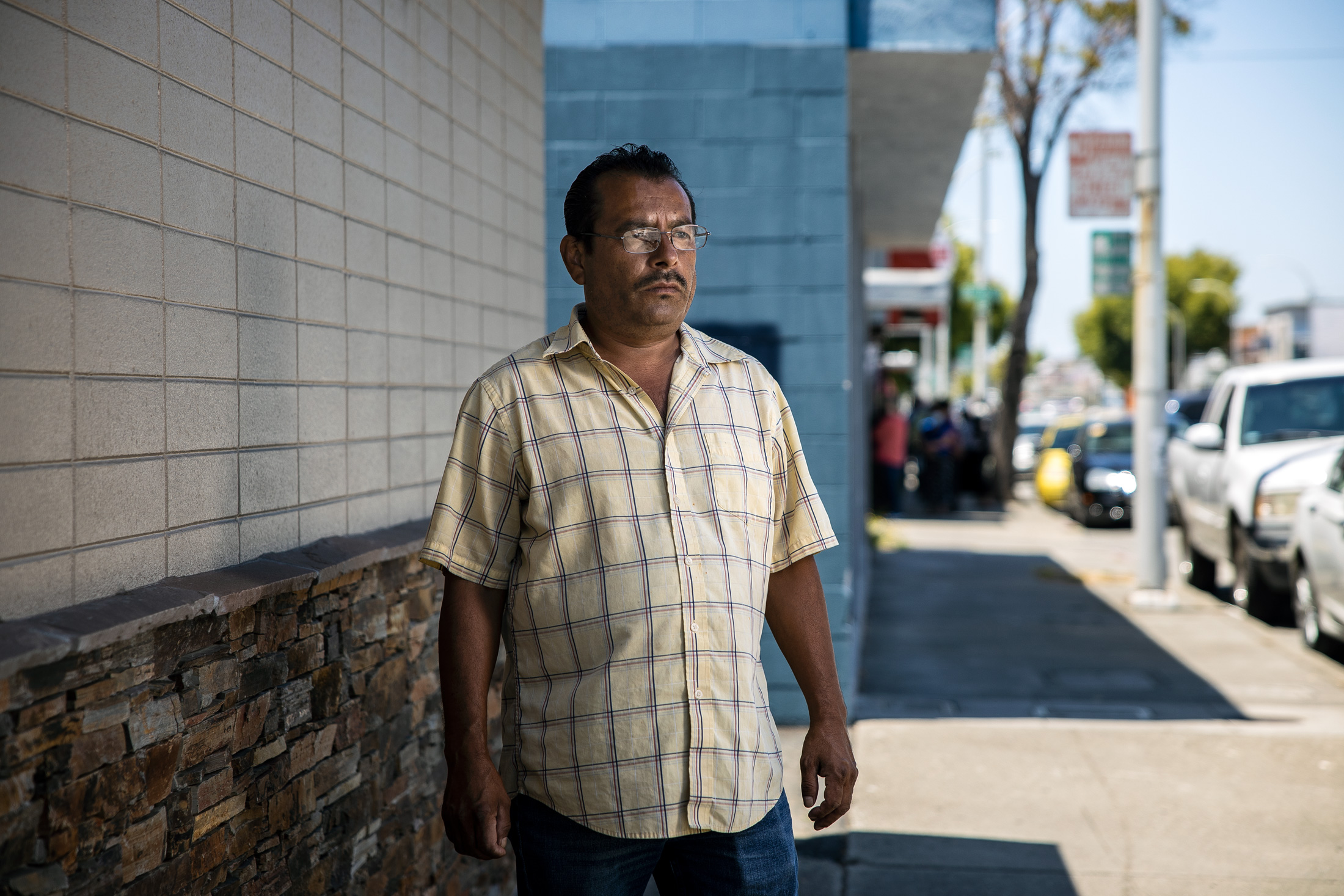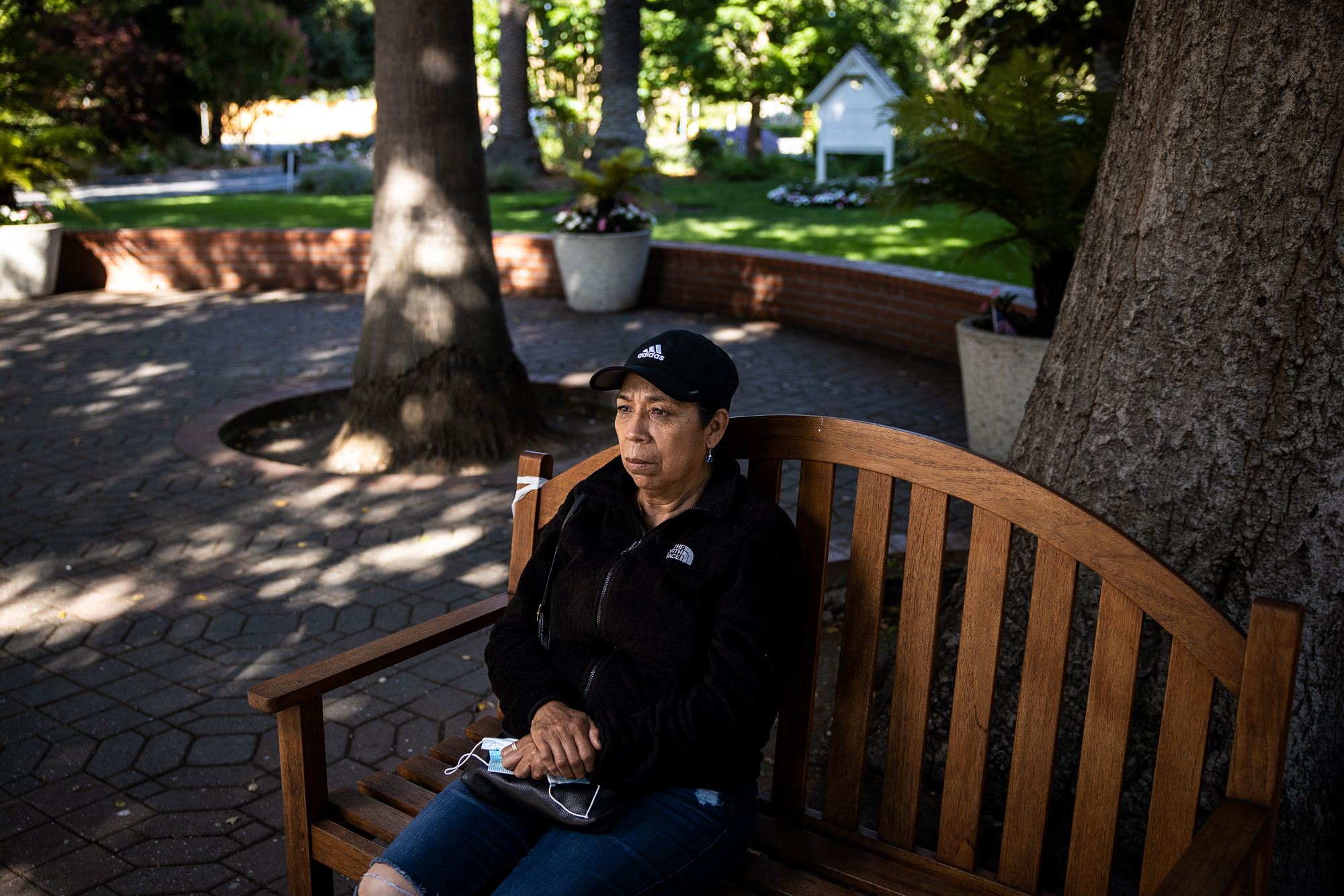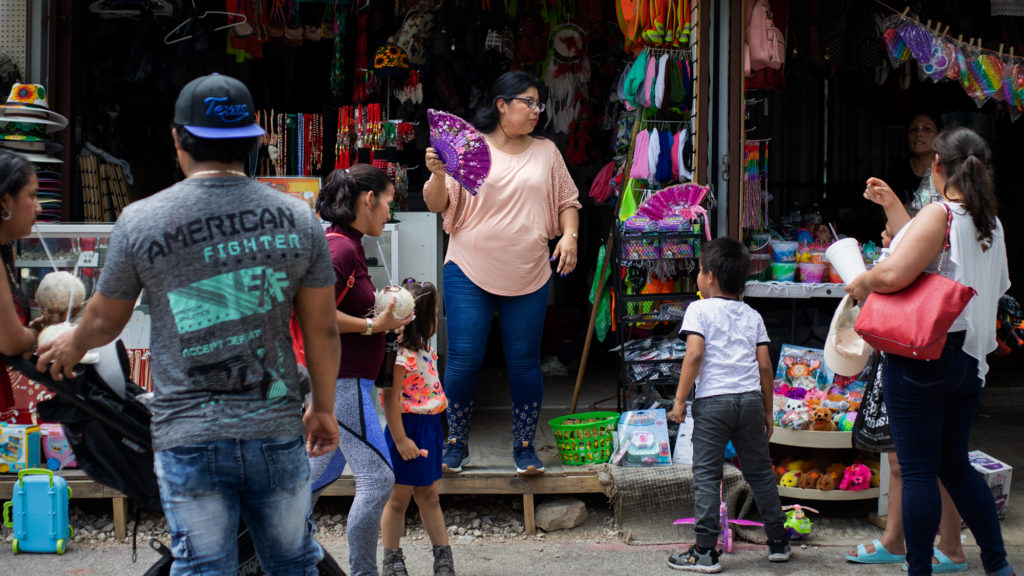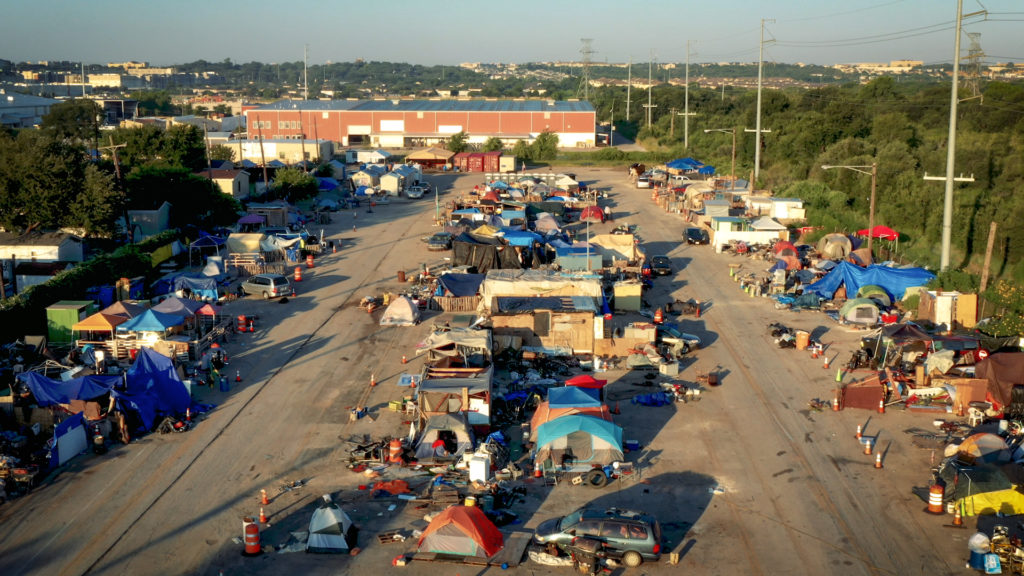Para leer esta historia en español, haga clic aquí.
María L. goes to church every day to pray for her family’s health, for her neighbors, and to go back to work.
A domestic worker living in Redwood City, California, Maria is at high risk for severe illness from COVID-19 due to her age, but she needs to work in order to pay rent and put food on her table.
A few miles away, Carlos T. still makes his way to the usual corner every day, where he waits alongside a handful of fellow day laborers, hopeful of being picked for at least a few hours’ work but fearful of the risk he runs in the process.
“Without a doubt, we’re taking a risk [looking for work] and we’re all aware of that,” says Carlos of the dire circumstances resulting from months without a job. “At the same time, we know that it’s a risk we have to take. I can’t say if we’re desperate or brave, but we’re all out there looking.”
As the COVID-19 pandemic has wreaked havoc on the US economy, Latinos have led the nation both in terms of their disproportionately high rates of infection and their overrepresentation amongst the widespread unemployment that’s ensued.
And while the blow for many Americans losing their jobs has been softened by unemployment benefits or government stimulus checks, in many cases, the legal status of Latino workers has made them ineligible for such programs and left them largely to fend for themselves.
Workers in two types of jobs have been particularly vulnerable to the economic fallout the pandemic has unleashed: Day laborers and domestic workers.
“Employers are not hiring them, and there is of course panic on the part of the day laborer,” says Friar Rigoberto Calocarivas, who runs the Multicultural Institute, which supports immigrant communities throughout the San Francisco Bay Area.
“It’s not only living in fear of not having a job or being concerned about being kicked out of their apartments, but also concern about ‘if I test positive, am I also now damaging my community, my family?’”
Like most workspaces, the Multicultural Institute was forced to transition to remote work in March. Seeing the growing need in the Latino immigrant community, the organization took advantage of its newly emptied office spaces by converting them into make-shift food pantries where hundreds of families now line up each Thursday morning for a bag full of food each.
At the same time, the Multicultural Institute shifted from providing skills training and job placement to impromptu case management, attempting to connect the hundreds of families they support with the resources they need to tide them over.
Still, Calocarivas says the Multicultural Institute’s efforts are only a drop in the bucket compared to the needs of day laborers and domestic workers in the San Francisco Bay Area, which he says have largely gone unseen by the public. “I think of a day laborer as somebody who is out there on the corner, quite visible, yet for all of these matters, they are very much invisible.”
The following conversations with day laborers and domestic workers in the San Francisco Bay Area have been edited for brevity and clarity. Last names have been omitted to protect people’s identities.
Edelmira V.
Edelmira leans on the fence at the Andrew Spinas Park in Redwood City, California, where she and her children often walk to take a break from being inside and to get some fresh air.
“For the past 15 years, I’d been working cleaning the same house every day and I loved it.
The owner was so sweet. It was almost like I became one of her daughters, but she had me stop coming in March because of the virus and then she fell ill and died on April 2nd. For years, I had taken care of her so it hurt my soul that I couldn’t be there while she was sick.
My routine was that I would arrive at nine in the morning and leave by two in the afternoon — I couldn’t work more than five hours because I have to take care of my children. I have three daughters — 17, 14, and nine — and my son is four years old.
I haven’t been stressed by staying home with my kids because of the pandemic. We study together, and with the youngest, I try to teach him activities to get him ready for when he goes to preschool, or at least kindergarten.
We go for walks everyday in the afternoon at the local Stanford campus to get a little fresh air.
For me, it hasn’t been stressful. Actually, the opposite. We learn new things and build stronger relationships with each other. We try to do new activities together, and we talk about problems that we’re having or about the things that we like. I’m learning to be a mother and a friend.
Since I found out that my boss died, I’ve been looking for work, but the pandemic has kept me from finding anything. I’ve applied to work at a number of places, but things are still too slow.
The truth is that things have been kind of hard. I’ve had to search for different kinds of help. There does come a moment where you feel the pressure building up, but you have to let it pass because all that will do is stress you out and depress you, and you won’t be able to do anything then.
One organization helped me pay last month’s rent, and there are different places that will give you food. If it weren’t for these things, we might be on the street. A single mother with four children…
I’ve also tried to cut our expenses to the minimum: internet, electricity, water. That’s it.
I just submitted an application to Target to see if they will give me a few hours there because I’m going to have to pay rent next month. I’m waiting to hear back from them.
If they approve me, I’ll take it. There isn’t a lot to choose from, so I’ll take what I can get.
I tried applying at Kohl’s, the clothing store, but they said they didn’t have any jobs for the time being and that they’re working with a reduced staff as it is.
I’ve never worked in a store before, but now that I don’t have my boss anymore I have to find some other solution. It’s like I lost my right arm, but I’m hoping for the best out of all of this.”
Carlos T.
Carlos stands in front of his apartment building just off the I-82 freeway in Redwood City, California. He and his roommates have added two additional renters (six in total) to their two-bedroom unit in order to cover rent.
“For us day laborers, our work typically varies depending on the time of year. In the summer there’s a good amount of work, but in the fall and the winter it really slows down.
So we’d been coming out of a really slow winter, and things had already been really hard because there were already so few jobs out there. There was a lot of rain this year and the construction and yard work were already slow when the pandemic hit and it really caught us off guard.
I always save a little money for the months when things are slow, but there wasn’t enough time to start saving again before the pandemic hit. It’s been months that we haven’t been able to work, and things have only gotten worse. I don’t have the money I need to pay rent, and my roommates are in the same position. So we risk our lives by going out to look for work.
Even though we know people aren’t hiring us, we still go looking for work. We stay out waiting for even the slightest opportunity. Sometimes we get a job, but it’s only for a few hours’ work. And most of the time, it’s only the hardest jobs that we get, or the dirtiest jobs.
Without a doubt, we’re taking a risk and we’re all aware of that. At the same time, we know it’s a risk we have to take. I can’t say if we’re desperate or brave, but we’re all out there looking.
One thing that my roommates and I have done is that we’re sharing our apartment with more people. We added two more people, so now we’re six people sharing the two rooms.
It’s not easy to live in such close quarters, or to tolerate others and to have them tolerate you. It’s not easy, but we’re getting by. We’re ok for now.
The only problem is that since we’re all out looking for work, we know that when we go home we could become infected as well.
I’ve also had to talk to my family in Honduras. I can’t really send money right now to my mother or my daughters. They understand the situation that we’ve been going through, just like they’ve been going through it over there. They’re seeing a lot of problems there as well.
I really want my daughters to study and become someone in life. I always told them, ‘It’s your job to dream. I’ll take care of the rest…'”
Rebeca S.
Rebeca often goes to the Berkeley Marina in Berkeley, California, to walk and escape the stress that not being able to earn a living has brought on.
“Work-wise, I clean houses, and the impact on people who clean houses has been really big because people are afraid for you to go to their house.
There is one person that still lets me clean their house, but I have to take off my shoes and put on a mask and wear gloves and I’m worried that I might hurt my foot walking around without my shoes on.
I’m lucky that I have this person because I need to work — I really don’t have any other choice. One other person is letting me do yard work for them, tidying up their garden. They also told me to bring my own gloves and mask, but it doesn’t really pay much.
I need more. I need more work if I’m going to be able to pay my rent. I don’t have any way to do it. I don’t have any more money, so that’s a little difficult, stressful, so I try to find ways to not be so stressed all the time.
I don’t like to watch TV all day, especially since it’s always about the virus. I listen to music, or I try to learn things online so I can keep my mind occupied and not focus so much on the news.
I wonder how long I’m going to go without work. Not that staying home isn’t work — I’m a single mother, so I don’t have anyone else to help me with my kids. I’m the mother and the father of our family, and that’s really stressful. Two of my kids are living with me, and my daughter is old enough to live on her own.
I’m hanging on by a thread, really. The person whose house I clean and the other person whose garden I work in — that’s only once every other week. I have to keep doing it because I need it, but it doesn’t pay a lot, so I ask myself, ‘What can I do? Should I go beg?’
I really don’t know.
I thought about going to sell tamales on the street, but there’s a lot of virus out there.
I can make tamales. I know how to sell. I can make tacos and chiles rellenos and pozole. I haven’t tried to do it, though, because I don’t have a restaurant license, and I don’t want to get in trouble with the city. There are people who do it, but I’m a mother and I’ve always tried to do the best for my children. I’m afraid.
Right now, thankfully, my daughter got called to go work at Home Depot. She’s been working, and she is helping me out. I never wanted to ask for money, and everything that she gives me goes to paying for rent.
It scares me because she’s around lots of people, so I always tell her to wear her mask and to wear her gloves.
I ask God to protect her for me.”
Gabriel P.
Gabriel takes a break from volunteering at the weekly food distribution provided by the Multicultural Institute in Richmond, California.
“I hope that the work picks up because it’s been hard.
I’ve been working two, maybe three hours per day. No more. That’s not nearly what I need to work, but there’s nothing else I can do for the moment.
It’s not stable work that I’m doing either. I don’t know what day or what time I’ll be working, which makes it harder.
I’m really behind on rent. I’m more than a month and a half behind. My family and I, we’ve only been able to pay it little by little, since the work has slowed so much.
Our landlord hasn’t tried to kick us out because I think he’s following the state’s rules because they put a stop on evictions and on paying the rent.
The only thing that we need is more work, and I hope that things will get better from now on.
What I’ve been doing is volunteering [at the Multicultural Institute] when they distribute the food, and that way I bring some home too. The governor in California gave us $500 because we’re undocumented, but that’s the only other support we’ve gotten.
I came to the area in 1997, so it’s over 20 years that I’ve been here and this is the first time that it’s ever been this hard. Even during the crisis from ten years ago, it was never like this.
The little money that we had saved ran out really fast. We had been saving for a rainy day, maybe a slow winter, but we only had enough to last a week or two. We never thought it’d be like this for months.
I don’t think I’d get sick if I went back to work more, but you never know since you can’t see this virus until weeks later.
It’s sad how things have gotten around here. Before, you would never have seen the lines of people waiting for help. That’s where you see the real impact of the virus. All over the place people are asking for food, and it’s good that they can find it.
But at the same time, the debts keep piling up.
The only way to be safe is to work.”
Maria L.
María sits in the courtyard at the Church of the Nativity in Redwood City, California, where she’s been going daily since the onset of the pandemic to pray for work.
“It’s been really bad. Really bad. I’ve felt like I’ve been in shock since the first day.
I got really bad, emotionally speaking, and when things got bad economically, I got worse emotionally. Now things are really bad economically.
I remember going to Costco and the lines were horrible and everyone was filling their baskets like there was no tomorrow.
I started worrying that if we were all going to be locked up at home, we wouldn’t be able to make any money to buy food or pay our rent. And our family, unfortunately, is undocumented.
My husband and I tried, but we couldn’t get any of the support or benefits they’re giving to other people.
I work cleaning houses for someone else and that person manages the relationships with the clients. Our clients helped support her by paying her, even though she wasn’t going to work, but they didn’t give anything to me.
I’ve been doing this work for 10 years, and the truth is that you can’t really save much doing this kind of work.
But the other thing is that my father died in January, when this was all starting, and I had to spend most of our savings.
Of course I’d go work, even with the virus out there, because we need the money and because I trust in God.
Little by little, nothing is the same. We can’t buy enough food any more. I had to talk to my family — my husband, and two sons who live with us — when this all started and tell them that we’d have to learn to eat whatever there is to eat. I told them that we couldn’t waste anything. We couldn’t buy any little extra treats.
My sons didn’t really get it, but little by little, they’ve come to understand, and we’ve been doing it.
I wish I could go back to work tomorrow, especially since I think my boss is cleaning one or two houses here and there. The situation is that since she needs the money,she can’t take me because there isn’t enough.
It would have been nice if the millionaires around here — my clients are really rich — would have had good hearts and if they would have shared at least a little. Even the littlest bit they could have shared with the people who are suffering through this situation.
I feel so sad about this situation that I ask God to put an end to it soon. I pray to God, and I ask for work and that he protect my family. And not just my family, I pray for everyone else, too, because you can’t just think about yourself.”

